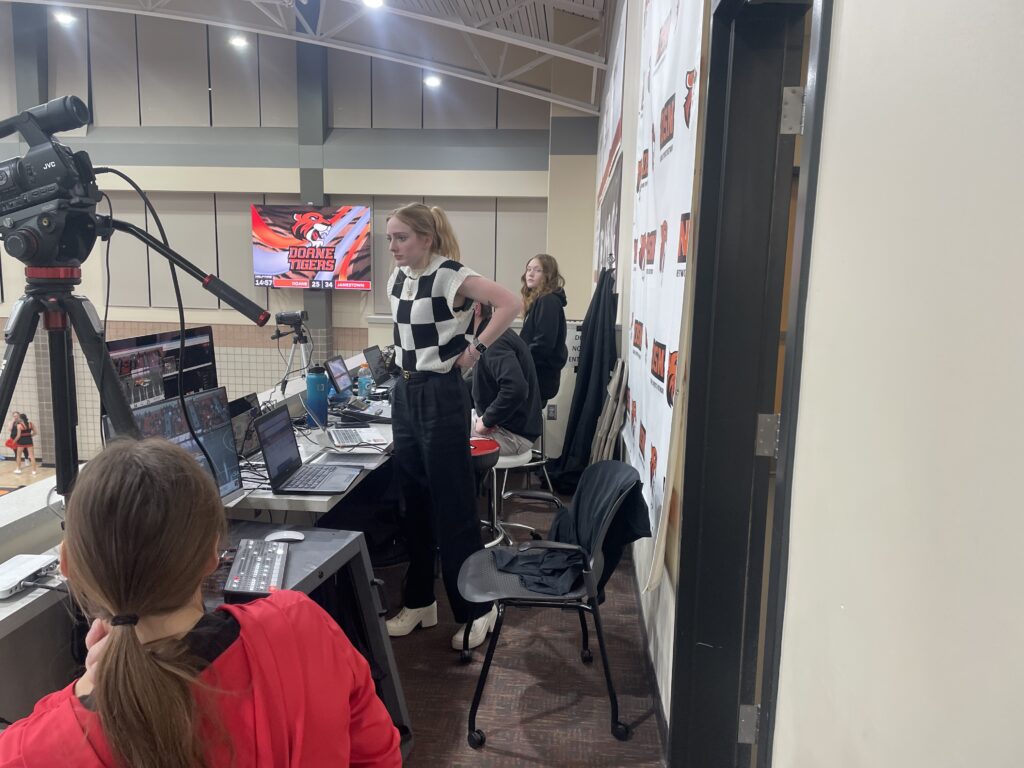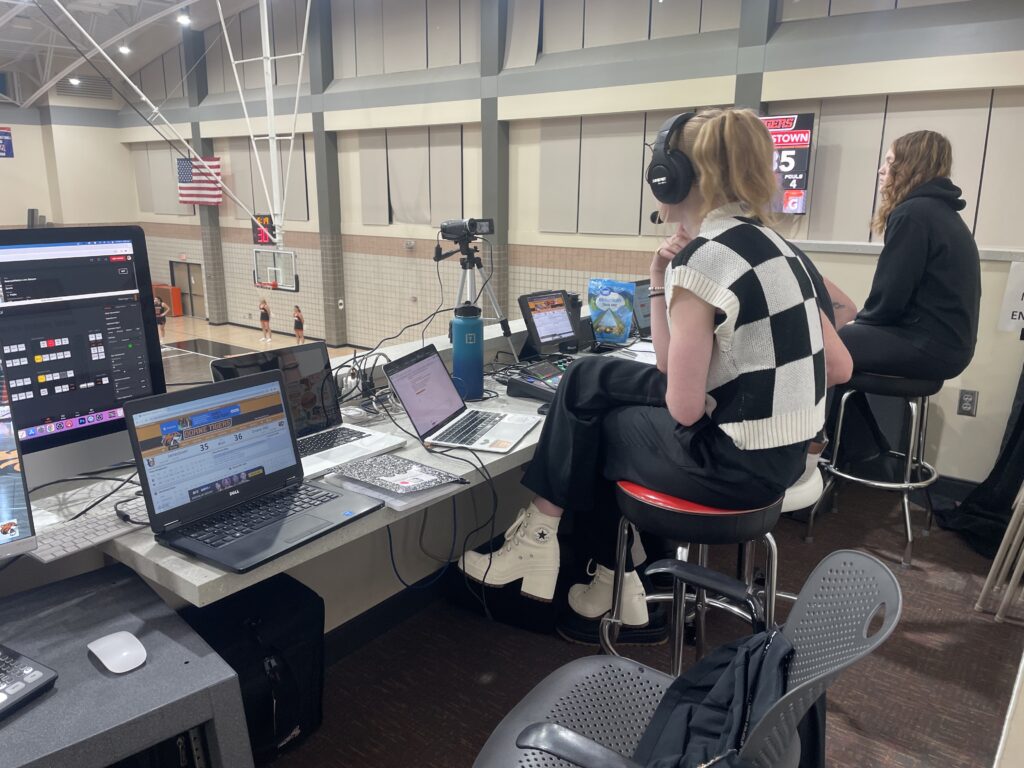Chase Wilkinson
When people turn on the television, computer or smartphone to watch a sporting event, they are there to watch the game or match, of course, but people rarely talk about the commentators for the event.
When I think of famous commentators, I have to put Jim Nantz as one of my personal favorites. Nantz covers some of the biggest spectacles in sports, with the Masters and the Super Bowl at the top of the list. He just has a strong, noble voice with loads of enthusiasm and knows how to get the attention of the viewer.

Kessler takes a breather during halftime.
Commentating, in my opinion, is the unsung hero of sports entertainment and commentators do not get enough credit for what they all do to prepare and commentate a sport. To get a full inside look, I got to sit beside and interview Cassie Kessler, senior media and communications and English major and head commentator for Doane. I tried to put myself in her shoes to see what tools and skills it takes to make it in the commentating world.
Me: Where does your interest in sports come from? Did you play sports in high school, or did you just grow a love for commentating one day?
Kessler: My entire life I have been around sports. I played a few when I was younger. My mother has been a big influence because we have had sports on in our house all the time. Regardless of the season and the sport being played, they were on the TV. I kind of just always have been around them. My mother was a big basketball fan so I obviously gravitated towards that. I was big into English in high school, then I found a journalism class and found a way to pair the two things that I love.
What got you into commentating? Was it a skill you learned at Doane or was it in high school like you said where you paired English and journalism in high school?
I didn’t start commentating until I got to Doane. I heard about a job opportunity with the sports network, and it sounded like something I wanted to be a part of. Obviously, it was the perfect area for me to go into due to enjoying sports and wanting to work in media. Then I had a conversation with Rick Schmuecker, the assistant athletic director at Doane, about what my intentions were and told him that one of my dreams was to work for ESPN, either as an analyst or a commentator or something like that. He said that it was just him commentating games and asked if I wanted to do that.

Kessler focuses on the game.
What is one part of your commentating job that you find the most challenging?
I think the most challenging thing about commentating is just trying to remain very neutral during the whole thing, especially at Doane. It’s very difficult because it seems like you just can’t win sometimes because if I am too neutral, people will complain that I don’t support Doane enough, but if I am overly supportive of Doane, people will complain that I am not neutral enough, so it kind of seems like there is always something that I am doing wrong. That was hard to accept for a while because I am a perfectionist, so I was thinking, How do I make sure that everyone is happy during this commentary? And I came to realize that there is no way that you can please everyone, which was really challenging to step back and be okay with that, but once I made peace with that, it’s not that bad.
What do you think is your favorite/most enjoyable part of commentating?
I think my favorite part and most enjoyable part of commentating for me is just to be in that environment. It’s never something that I anticipated being able to do at this level, and the fact that I have been able to commentate volleyball games and basketball games, and now Rick [Schmuecker] is teaching me how to commentate wrestling. There are just so many opportunities that I didn’t expect to have, and I know it’s obvious but I love sports so much so being able to be around them and feel like I have an inside scoop on things, it’s so much fun.
Are there any certain steps that you take to prepare for commentating on a game?
Before a game, I will receive a pronunciation sheet from the other team. They usually send it to me a couple of days before so I can start to familiarize myself with what names go with what number, how they say it, and things like that. After that, I will either go to our Doane athletics website if it’s a team we have played before, or if it’s not, I will go to the NAIA website and start to do a lot of research. I typically try to have a page of notes on each team before the game so that way there are plenty of things to talk about during timeouts, halftimes, and stuff like that, and then I will just prepare a few basic interview questions for postgame interviews. Then, if necessary, I can tweak them or change them depending on how the game goes, but I like to create a general outline for myself so I have talking points throughout the night.
What are some different skills or lessons that you have learned over the years of commentating?
I think one big lesson that I have taken away from commentating is being more sure of myself and trusting myself. Sometimes I have a tendency to discredit how much I know about sports, especially sports that I have never played before. I absolutely love basketball and a lot of people assume that I have played before and I have not, so one thing that is really hard for me is trusting myself and telling myself that I do know what I am talking about. That is one thing that commentating has really helped me with. I would say another thing is public speaking. I did not love listening to myself before commentating, and I never thought of myself as a public speaker, but now I watch games back, so I can critique myself so I can get used to it, and commentating has helped with that so much.
What would be your dream job connected with commentating?
My dream is to be an analyst for ESPN or a reporter for the New York Times. With both of those jobs, public speaking is going to be a big skill that I need to be proficient in, so I think commentating helps with that very much.
What advice would give to someone starting out with commentary?
That’s a good question. My advice for someone starting out commentating is just to go for it. It sounds kind of cheesy but there is a lot of hesitation, especially the first couple of times you do it when you realize it is your voice that is on the air, people can hear you, and stuff like that. I remember my first time [commentating], I was sitting right next to the computer and I could see how many people were watching the livestream. I realized how many people were listening to me, and that can be terrifying, but at the end of the day, you are in your own space doing your own thing. You don’t have to deal with a live audience, so just take that leap of faith, and just believe that you are able to do the job that you want to do and go forward.

